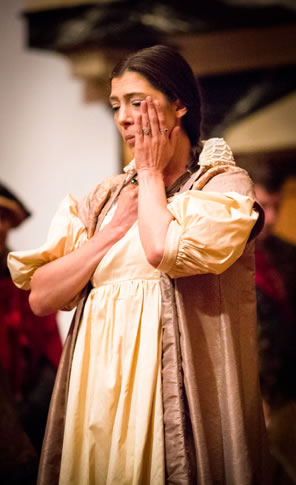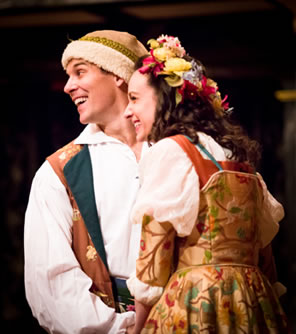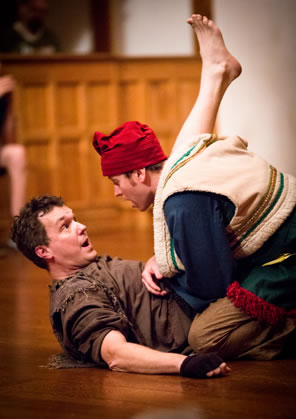The Winter’s Tale
Bearing Up under Male Tyranny
American Shakespeare Center, Blackfriars Playhouse, Staunton, Virginia
Saturday, September 19, 2015, C–4&5 (front middle stalls)
Directed by Jenny Bennett

Hermione (Abbi Hawk) stands trial, falsely accused of adultary by her husband, King Leontes, in the American Shakespeare Center's production of Shakespeare's The Winter's Tale at the Blackfriars Playhouse. Photo by LindseyWalters, American Shakespeare Center.
Too hot does Leontes, the king of Sicilia, storm onto the stage in the frantic company of his lords, who are reporting how Leontes's best friend, Bohemia's King Polixenes, suddenly departed in the middle of the night with Leontes's most trusted advisor, Camillo. Leontes rages that his wife, Hermione, has had sex with Polixenes, and Camillo served as pander. In this, the third scene of William Shakespeare's The Winter's Tale, we know what's going on—not that anything Leontes says is true but that he believes it to be so. However, the women occupying the stage before his arrival haven't a clue. The nine-month-pregnant-and-feeling-it Hermione and her ladies-in-waiting are playing games with the rambunctious Prince Mamillius in a scene of maternal domesticity when comes this violent intrusion—"Bear the boy hence. He shall not come about her"—from a man who is too hot for no reason.
Earlier in the play, Leontes delivers one of Shakespeare's most famous conundrum lines: "Too hot, too hot!" a sudden fit of jealousy that comes out of nowhere—reaching in two repeated words what took Othello an entire act and the psychological prodding of his ensign to reach. With Jenny Bennett directing this American Shakespeare Center production of the The Winter's Tale at the Blackfriars Playhouse, we get a woman's perspective. Inexplicable as the sudden fit of jealousy may be, women are subjected to such behavior in men all the time—Leontes is merely being a typical guy. Hermione's daughter, Perdita, will be subjected to a similar out-of-nowhere rage from Polixenes later in the play.
This elegant and elegiac production takes a subtly feminist slant, which not only gives us a shift in perspective but also empowers the three leading female characters, poignantly played by Abbi Hawk (Hermione), Stephanie Holladay Earl (Perdita, as well as her brother, Mamillius), and Sarah Fallon (Paulina). Jenny McNee costumes the courts in traditional Italian renaissance style, predominately black and gold dresses and robes for the Sicilian court, blue for Polixenes. The shepherds are in earth tones with bright floral highlights. In Sicily, every character has some clothing article of red; most notably for Hermione, who wears creamy white gowns, but her opening scene dress has satin red sleeves and is laced up in back with red ribbon—a metaphor, perhaps, for where she is about to be psychologically stabbed.
Typical of Shakespeare's other late romances, The Winter's Tale is a roller coaster of comic heights suddenly rushing into tragic valleys. Bennett smooths out the ride, presenting it as a progression to great joy with unbearable, unnecessary heartache along the way. She nevertheless maintains Shakespeare's ballsy juxtapositions. Rick Blunt is an earnest Antigonus, frightened by the elements, as he leaves the infant Perdita on the barren Bohemian shore before exiting, pursued by a bear. Immediately enters Allison Glenzer as the old Shepherd comically grousing about the behavior of teen-age boys (thematically apt). Soon after, Chris Johnston comes on in manic form as the Shepherd's son (identified only as Clown in Shakespeare's speech headings), hilariously describing the sailors' cries in the shipwreck and the bear "half dined on the gentleman." For the dance of the sheep-shearing feast, Glenzer's Old Shepherd starts off preaching, "Dearly beloved, we are gathered here today to get through this thing called life." Nope, it's not Shakespeare, but you've heard it before, and soon the cast is singing and dancing to Prince's "Let's Go Crazy," which then segues smoothly and most appropriately into John Denver's "Thank God I'm a Country Boy." This scene has the whole audience bouncing, clapping, and "whooing!" along (except the woman reading the play's text and now wondering where we are in the script), and it segues sweetly into the courtship of Perdita by Prince Florizel (Patrick Midgley at his romantic best). We're being set up for the eruption of Florizel's father, Polixenes (René Thornton Jr.) threatening death for the Old Shepherd and horrific mutilation for the young woman everyone believes to be the shepherd's daughter.
With Thornton's Polixenes, we can almost see this outburst coming (it's the intensity that's shocking, as Thornton does some scary, vein-popping stuff in this scene). Whereas Leontes is jealous of his wife, Polixenes is jealous of his son's affections. "If at home, sir, he's all my exercise, my mirth, my matter," he says of his son in the play's opening scene at the Sicilian court. Florizel's ever-increasing frequency of absence from the court bothers Polixenes, though, disguised and spying on Florizel, he can understand the young man's infatuation with the shepherdess, whom Polixenes calls "the prettiest low-born lass that ever ran on the greensward." However, Florizel's intent to marry Perdita lights his father's fuse, and hearing his son say that he will "not acquaint my father of this business" blows the powder keg that is Polixenes.
Serving both kings, and getting a front-seat view of their unwarranted behaviors, is Camillo. Gregory Jon Phelps plays the Sicilian advisor, who is ordered to murder Polixenes and then flees with the Bohemian king, with uptight dignity, stiff-necked and careful to maintain stoicism in his expression. Phelps, though, has become too subtle an actor to let his portrayal slip into something archetypal, and real human emotions and foibles peer through his official veneer. In this, we get one of the most psychologically engaging performances of the production, a man too frightened to stand up to a wrong, but brave enough to counteract it.
By contrast, James Keegan doesn't play Leontes with deep psychological complexities. He sits in his throne at the back of the stage warily watching Hermione as she woos Polixenes—at Leontes's behest—to forestall his return to Bohemia, and his obvious agitation grows into the "Too hot, too hot!" line. The subsequent musings of his ever-deepening descent into jealousy come from his own altered reality, which have no basis in any evidence we've seen. "Is whispering nothing? Is leaning cheek to cheek? Is meeting noses? Kissing with inside lip?" he argues to Camillo, though Leontes has seen nothing of the stuff he describes.
The tyranny that Keegan's Leontes expends on others in the play's first half he turns upon himself as penance in the second half. Yet, he can't help getting a boner upon seeing Perdita for the first time. Florizel begs Leontes to convince Polixenes to permit him to marry Perdita: "At your request my father will grant precious things as trifles," Florizel says. "Would he do so, I'd beg your precious mistress, which he counts but a trifle." Especially with the Oedipus subtext in play here, Keegan's unbridled leering is an "ew!" moment before Paulina intervenes. "Sir, my liege, your eye hath too much youth in't," she says (a line I never paid much attention to before: what a universal truth for us older guys). "Not a month 'fore your queen died, she was more worth such gazes than what you look on now." A slightly chagrined Leontes answers, "I thought of her, even in these looks I made." Yeah, right.
As this passage capsulizes, the kings may be tyrants, but the women rule. Hawk finds the foundation for her portrayal of Hermione in her self-description during her trial: "For behold me, a fellow of the royal bed, which owe a moiety of the throne, a great king's daughter, the mother to a hopeful prince." Hawk emphasizes that center point, that she is equal parts ruler in this realm. Even in her playful talk with Leontes and Polixenes in the opening scene (and what she initially thinks is Leontes's sport in the accusation scene), Hermione bears herself with royal grace and monarchal temperance. This not only leads to the incredible grace and gravitas with which she endures Leontes's slander, it firms up our feelings that Leontes has zero basis for that slander. In the statue scene, she comes to life with a gasp, as if coming out of a trance (Paulina as hypnotist—interesting suggestion), but even upon descending from her pedestal, she is "a great king's daughter" who still owns a portion of the Sicilian throne and now is the mother to a hopeful princess.


Top, Florizel (Patrick Midgely) courts Perdita (Stephanie Holladay Earl) in William Shakespeare's The Winter's Tale at the Blackfriars Playhouse. Bottom, the Clown (Chris Johnston, right), encounters Autolycus (John Harrell). Photos by Lindsey Walters, American Shakespeare Center.
Holladay Earl plays that princess with intriguing complexity—just as she played the mother in this playhouse for the ASC's touring troupe production in 2012. Sweet, tender, full of life, Holladay Earl's Perdita nevertheless remains cautious as Florizel courts her. Oh, she likes him a lot, but she also knows he's a prince and either he will come to his royal senses or his father will find out and intervene. She thus remains reserved while emitting a warm regard for him, and when his father does intervene, her expression is one of sad acceptance but a proud pout, too, in the face of Polixenes's threats: she is Hermione's daughter, after all. Only after Florizel reasserts his commitment to marry her does Holladay Earl's Perdita fall fully in love with the man.
Paulina, whom Shakespeare doesn't bring on stage for the first time until Hermione is in prison delivered of her baby (this production includes Paulina among the ladies-in-waiting of the earlier scene), wrests The Winter's Tale from everybody else in the Sicilian court. Fallon is up to the task with her own regal bearing and accomplished grasp of the nuances Shakespeare infuses in his verse structure and word choices. She shames the other lords for their silence in the face of a king gone crazy, she stands up to that king and, eventually, becomes his de facto queen in terms of political power. Yet, Fallon's Paulina never wavers from her true duties serving the real queen, Hermione. This creates a theatrical subtext as Fallon and Hawk double in the parts of Mopsa and Dorcas, respectively, the two simple-minded shepherdesses catfighting over the Clown's affections (and frankly, of the men in this play, he's the only one worth fighting for, a young man of simple justice).
The ensemble does rich work in portraying the consternated Sicilian court, the never-a-care (except Perdita, of course) Bohemian country peasants, and the gossiping lords back at Sicily. What Fallon's Paulina brings to the Sicilian scenes in drive and incisive line readings, John Harrell brings to the Bohemian scenes as the rogue Autolycus. Long-time Blackfriars audiences know with utmost certainty that Shakespeare wrote the role for Harrell—Shakespeare may have had Robert Armin in mind, but, really, Harrell's particular comical, musical, verse-reading, and improvisational talents were the ultimate aim of the part. Harrell can Shakespeare you with the best of them and on the line "Prosper you, sweet sir!" he can offer a split-fingered Vulcan salute.
Harrell also plays Archidamus, a usually forgettable Bohemian lord conversing with Camillo in the first scene, discussing Sicily's hospitality and the potential for Sicily's reciprocal visit to Bohemia. Harrell makes this scene unforgettable when, trying to explain what Bohemia has to offer by way of hospitality, his Archidamus inexplicably raises his hands like claws and roars—much to the stiff Camillo's astonishment. This moment kicks off both an insider theatrical joke as well as an allegorical arc. Having to deal with Shakespeare's most notorious stage direction, "Exit, pursued by a bear," director Bennett expands the bear into an ongoing motif in the play: the sudden and surprising appearance of a roaring beast hell bent on killing mirrors the actions of the two kings. Rather than going allegorical with the bear itself, Bennett casts an actor to wear a bear costume, looking like a mascot in a Smoky Mountain theme park, lunging after Blunt's Antigonus.
The word bear actually appears 35 times in the play, used in all its various meanings, most notably when Harrell as Autolycus along with Mopsa and Dorcas assure each other they can "bear my part" of a ballad. Six utterances of bear refer specifically to Antigonus's antagonist (including its use in the stage direction), and one of those references is in the conversation of the gossiping lords in the play's penultimate scene. In that scene, Autolycus is listening to the lords, and Harrell again does his roaring bear shtick at mention of the beast. These moments matter because Harrell also plays Time, the chorus who appears at the middle of the play to move the action 16 years forward from the Old Shepherd finding the infant Perdita. Playing Time, Harrell enters, post-intermission, wearing the same costume in which the actor last exited, pursuing Antigonus.
Eric Minton
October 28, 2015
Comment: e-mail editorial@shakespeareances.com
Start a discussion in the Bardroom



 Find additional Shakespeareances
Find additional Shakespeareances